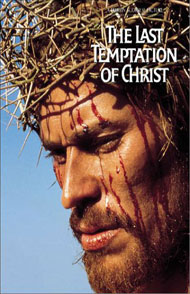
The
Last Temptation of Christ
(1988)

Rated: PG
Runtime: 1 Hour and 44 Minutes
Reviewer: Jones
Grade: A+"The Last Temptation of Christ" is one of the greatest films ever made.
Is that enough to make you watch it? Oh. You say you need some validation? Well, I suppose I can supply some for you since you seem genuinely interested.
"The Last Temptation of Christ" is a film like no other. It is director Martin Scorsese's greatest triumph. A true work of passion and commitment that needs to be seen to be believed. And I urge all of you to see it. Whatever you do, do not turn into one of the crypto-fascist naysayers who have deemed this film "morally offensive" despite the fact that they have never seen one single frame of this glorious film pass before their eyes. I would be forced to beat you if you fell into that legion of fools. So, for your sake as well as my own, watch the movie and then form an opinion.
It is a film that depicts this fellow I think you've probably heard of (he goes by the name of Jesus) as nothing more than a man. Granted he is a confused man, but a man nonetheless. His confusion stems from a voice that claws at him much the same as birds of prey would claw at their victims. Jesus himself feels very much the victim. He never wanted to be a conduit of God. Many times he asks to be left alone. He has even gone so far as to manufacture crosses, which are used to punish his own people, so that he make God hate him. Despite his myriad of attempts to be left to his own vices, the voice keeps speaking to him regardless of his pleas. A man named Judas attempts to talk some sense into him, but Jesus isn't terribly receptive.
Eventually Jesus comes across Mary Magdalene who is engaged in the world's oldest profession. One day he saves her from being stoned and, in the process, obtains a following. He preaches to them and many choose to follow him wherever he may decide to go. His path leads him to a number of familiar places and people. Along the way he meets John The Baptist, spends forty days in the desert, heals blindness, ressurects Lazarus, etc. This all leads to his realization that he must die on the cross, which is the part of the film that those aforementioned naysayers had a problem with despite never seeing it.
While Jesus is on the cross he is confronted by his greatest temptation: The realization of having the life of an ordinary man. The wife and children. The whole ball of wax so to speak. He gives into this temptation and finds the life he never would have found had he remained on the cross. He gets married, has children and grows old. As he is on the cusp of death, Judas shows Jesus that he has done wrong. Knowing this, Jesus asks for his Father's forgiveness. As to whether or not he receives it? Well, you're just going to have to watch the movie to find that out.
For most great films there are many moments that are responsible for that greatness. "The Last Temptation of Christ" stands into contrast to those, as it is one continuous two hour and forty-three minute great moment. It is a great moment that contains one of the greatest performances celluloid has ever been fortunate enough to contain.
Willem Dafoe delivers a performance that is nothing less than the embodiment of Jesus. It is a dynamic performance that is wrought with heartfelt emotion and tenderness. He is both strong and weak. Strong when leading his people and weak when faced with the realization of who he is and what he must do with his life. There is not a moment that goes by that makes you think this is Willem Dafoe you are watching. This is Jesus himself taking us through his life.
The night that he first confronts Mary Magdalene. The day he saves her life. The nights of temptation in the desert. The day he carries his cross to the hilltop where his death sentence is to be carried out. You are there alongside him during this time. You will weep as the nails are driven into his hands and feet. It is only as the end credits roll that you realize that this was a performance and not a firsthand account of the events just witnessed.
All of the other performances are great as well. Harvey Keitel as Judas. Barbara Hershey as Mary Magdalene. Harry Dean Stanton (What movie is this man not in?) as Saul/Paul. The list goes on and on. They are all overshadowed by Dafoe, but they each find their niche and fill it graciously with well-defined performances.
Scorsese's direction of this biblical epic is, of course, without flaw. He draws out all of the previously mentioned performances, while balancing them with some truly gorgeous cinematography. When you think of the stories from the Bible, you will visualize them as Scorsese's lens would have seen them had he been there. With this rarest of collaborations of cinematography, performances, and Peter Gabriel's score you can rest assured that you are going to witness a landmark film that will reside in your consciousness for the remainder of your existence on this Earth.
Anyone who knows me, knows that I am not a religious person. What I am is a moral person who would like to think there is a little more to the world than what is readily apparent. Now I am not saying that this film made me a believer, but it did definitely give me food for thought. I think for those who are of the faith, this film should serve as an affirmation of that faith. It shows us that Jesus was a three-dimensional person with much conflict and emotion inside him rather than the one-dimensional caricature of a human being that we are typically bombarded with. In that respect and many others this film is a breath of fresh air into the stagnant world of dogmatic philosophy that is prevalent in the world. For that I thank Martin Scorsese. This is a film that took a large portion of his life, as well as a great deal of courage, to bring to fruition. Greatness and courage go hand in hand. "The Last Temptation of Christ" is no exception. It is the rule.
This film is greatness realized.
